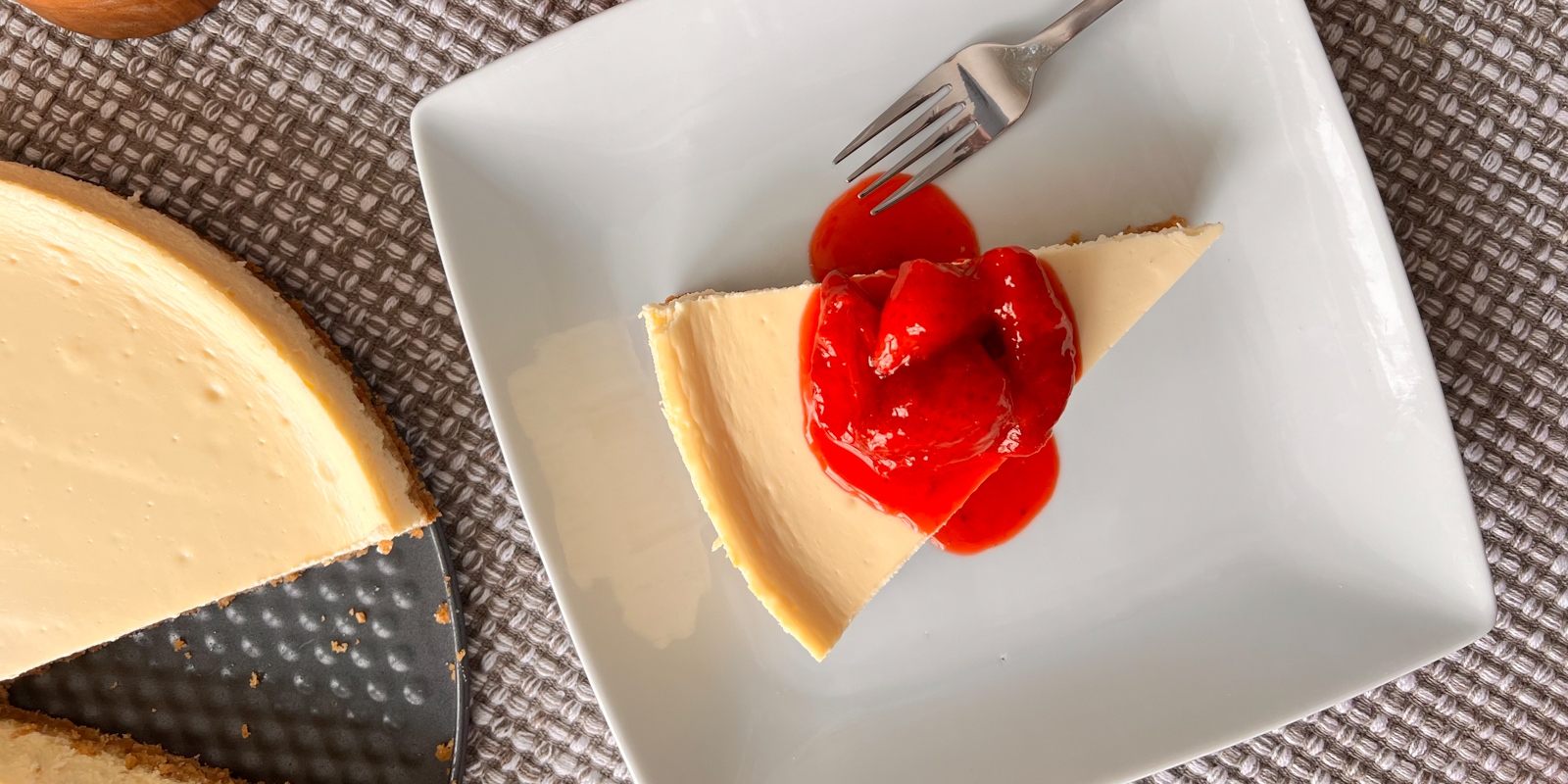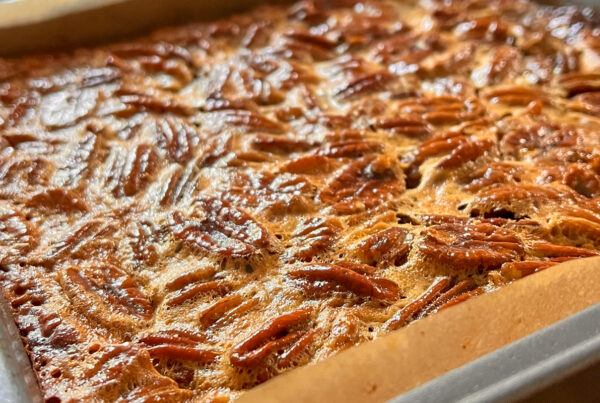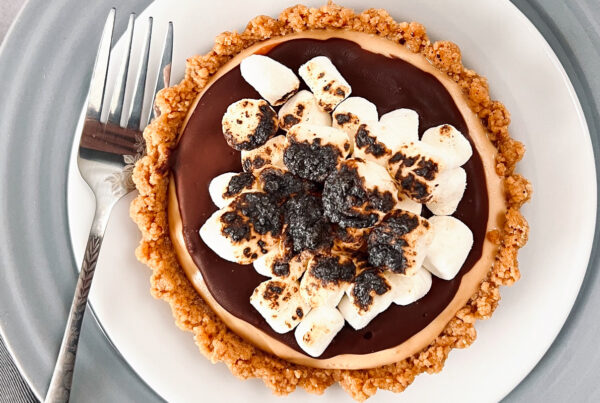Cheesecake is a decadent and timeless dessert fit for any occasion, and this post is geared toward beginners and features ten tips to make cheesecake perfectly every time. Additionally, I’ve included a family recipe for homemade cheesecake (New York Style) that is smooth, creamy, and oh-so-dreamy.
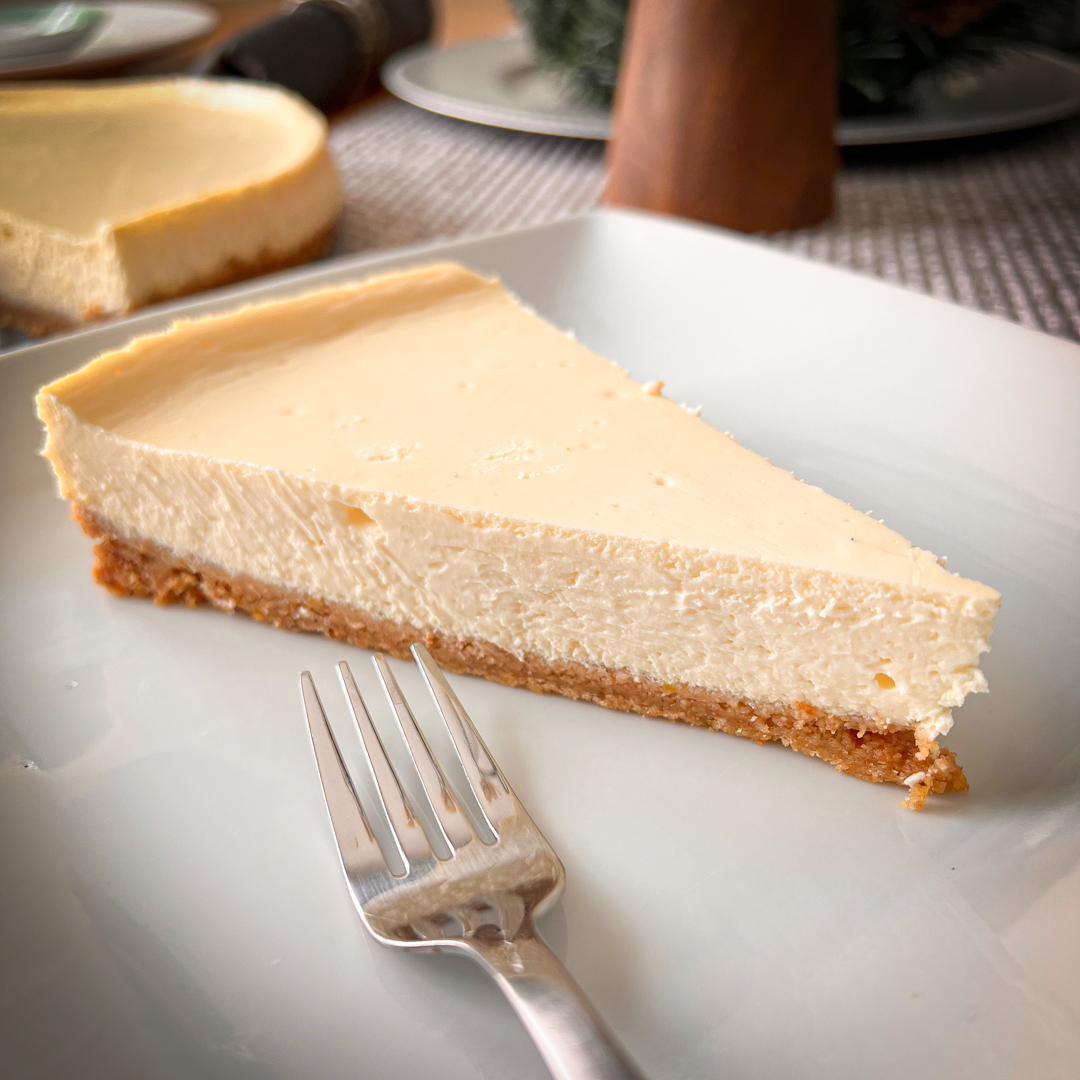
Tips To Make Cheesecake Perfectly
#1: Use Room Temperature Ingredients
One of the essential tips for making a perfect cheesecake is ensuring your ingredients are at room temperature. This includes your cream cheese, eggs, AND sour cream. Room-temperature ingredients will blend more efficiently, resulting in a smoother, creamier cheesecake. They will also help the cake bake evenly. Cream cheese especially tends to make a batter slightly lumpy if it isn’t brought to room temperature. This recipe for homemade cheesecake includes a step to beat the cream cheese solo to help break any lumps.
#2: Use a Springform Pan
A springform pan is a must-have for making a cheesecake. This type of pan has a removable bottom and sides that can be unlatched, allowing you to easily remove the cheesecake from the pan without damaging it. Make sure to wrap the bottom and sides of the pan with aluminum foil before baking to prevent any leaks. Also, learn from my mistake: Do NOT unlatch the sides until the cheesecake has fully chilled in the refrigerator and you’ve slid a knife around the edges to ensure the cheesecake doesn’t stick to the pan. I once cracked my perfectly cooked cheesecake by accidentally hitting the latch while it was still setting. 😞
#3: Use Quality Ingredients
Ingredients from trusted sources make all the difference in a recipe, especially one requiring very few ingredients. Stick with well-known brands that clearly label products, especially those that do not add fillers or unnecessary sugar and salt.
#4: Preheat Your Oven Properly
Once your oven registers that it is preheated to 325°F / 162°C wait at least 10 more minutes before adding the cheesecake. Most ovens do not reach the set baking temperature even when they chime to signal they’re ready. Read my FAQ page for more information on calibrating your range and using an oven thermometer to dial in your baking experience.
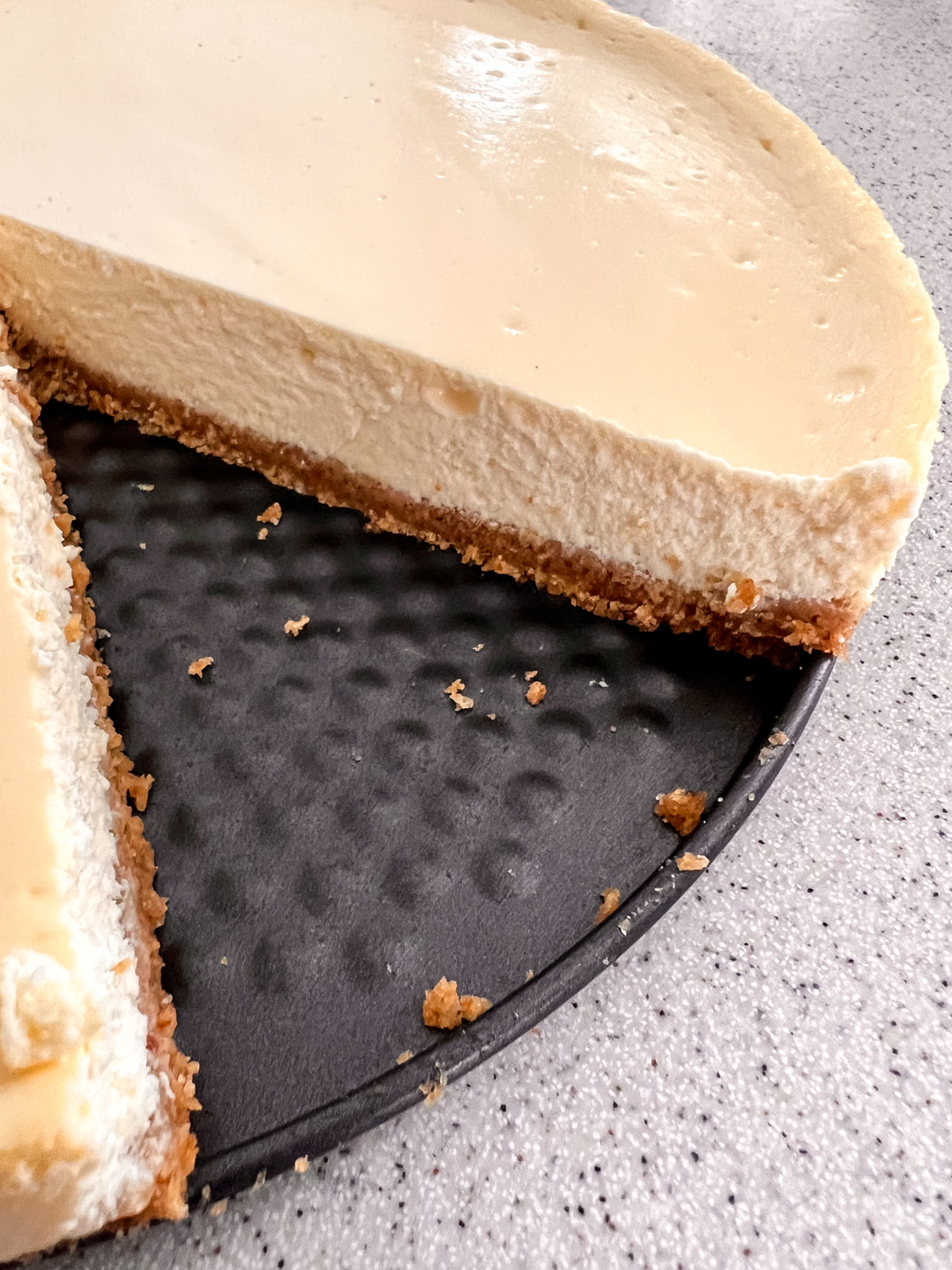
#5: Don’t Overmix the Filling
When making the filling for your cheesecake, be careful not to overmix it. The recipe details the amount of time to mix ingredients after each addition. Overmixing can cause the cheesecake to crack and become dense, which will cause some sad faces in the room (they will still happily eat it, though).
Mix the ingredients until they are just combined and smooth, but be sure to scrape the sides of the bowl after each addition to ensure that everything is fully incorporated.
#6: Be Patient While the Cheesecake Bakes
This is not a dessert that can be rushed to make cheesecake correctly–take your time, man. Once it’s done baking, let it cool in the oven with the door slightly ajar for about an hour before removing it to cool for another 30 minutes on a wire rack. At that point, it needs to be refrigerated for several hours, but more on that later. Temperature fluctuations cause cracks and issues with texture, so you don’t want to jump from baking to the refrigerator without some tender loving care in the form of time and space.
#7: Know the Signs of a Fully Baked Cheesecake
There are cues to look for to tell when a cheesecake is baked. Overall, it should appear set with a slightly jiggly center. The edges will be a light golden brown and should puff slightly. Gently tap the cheesecake pan with a wooden spoon to spot the jiggle. Another good rule of thumb is the filling temperature will read 150-155°F (65-68°C), but I opt for visual cues instead so that I don’t mar the top with a thermometer poke.
#8: Don’t Rush the Chilling Process
The cheesecake needs time to firm up and reach a pleasant refrigerated temperature for consumption. This takes a MINIMUM of 4 hours to achieve, and preferably you’d let it rest overnight. Cover the cheesecake with foil after it cools to room temperature before putting it in the fridge. Otherwise, condensation can form from any steam that gets trapped.
#9: Cracks Happen
Cracks happen even when you try your darndest. Several factors can cause them: overmixing, overbaking, rapid changes in temperature, or accidentally hitting the springform latch too soon (did I mention I was bummed about that??). Thankfully this recipe is forgiving, thanks to the moisture the sour cream adds. A crack doesn’t mean it is terrible or needs to get tossed. Throw some chilled fruit topping on top of the whole cooled cheesecake and allow it to set before serving.
#10: Use a Water Bath (optional)
A water bath can be helpful to make cheesecake, but it is optional. It is especially not required for this recipe. A water bath involves placing the springform pan in a larger baking dish and adding just enough water to the dish to come up the outside of the pan halfway. This helps to create a moist and even baking environment which can help prevent the cake from cracking and drying out. If you go this route, don’t forget to add a layer of aluminum foil around the springform pan to prevent leaks in or out.
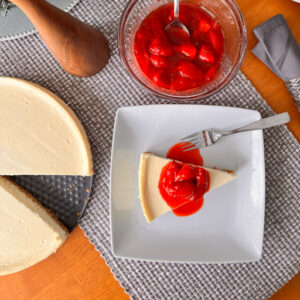
Easy Recipe for Homemade Cheesecake
Equipment
- 1 9" or 10" Springform Pan
- Measuring Cups and Spoons
- Mixing Bowl
- Rubber Spatula
- Hand or Stand Mixer
Ingredients
Graham Cracker Crust
- 14 Graham Cracker Sheets crushed or pulsed in a food processor (about 2 cups of crumbs) - 196g
- ¼ Cup Granulated Sugar or Light Brown Sugar 50g
- ½ Cup Salted Butter melted - 113g
- ¼ Cup Ground Nuts (ex. walnuts, almonds, or pecans) optional - 28g
Cheesecake Filling
- 16 Ounces Cream Cheese (2 8-ounce bars) softened to room temperature - 453g
- ¾ Cup Granulated Sugar 150g
- 24 Ounces Sour Cream room temperature - 680g
- 2 Tsp Pure Vanilla Extract 8g
- 3 Large Eggs lightly beatened
Fruit Topping
- 2 Cups Fresh or Frozen Strawberries 280g
- ⅓ Cup Granulated Sugar 67g
- 2 Tsp Fresh Lemon or Lime Juice 10g
- 1 Tbsp Cornstarch 8g
Instructions
- Preheat oven to 325°F / 162°C. Ensure an oven rack is in the center position.
Graham Cracker Crust
- Mix the graham cracker crumbs and sugar in a medium bowl until combined. If adding ground nuts, do so now and whisk to combine. Add the melted butter and fold with a rubber spatula until evenly incorporated.
- Pour the graham mixture into a 9" or 10" springform pan, and using the bottom of a glass cup or your palms, press firmly down on the mixture to form a bottom crust. You can press and assemble the graham mixture up the sides of the pan if you prefer, but the bottom crust should be the thickest. Set aside the pan while you prepare the filling.
Cheesecake Filling
- Add the cream cheese to a large mixing bowl or the bowl of a stand mixer fitted with a paddle attachment. Beat on medium speed for 2 minutes. Scrape down the sides of the bowl with a rubber spatula, add the sugar, and beat on medium speed for 3 minutes. Scrape down the sides of the bowl.
- Add the sour cream, and mix on low speed for 1 minute. Scrape the side of the bowl. Increase the speed to medium-low and mix until well combined, about 1-2 minutes more.
- Add the vanilla to the eggs, and add this combo to the sour cream mixture. Mix for 2 minutes on medium speed. Scrape the sides of the bowl.
- Pour the filling into the springform pan over the graham crust, and smooth it out evenly with a rubber or offset spatula. Place a sheet of foil underneath the springform pan, just large enough to encompass the pan's bottom half on all sides. This will prevent melted butter from escaping if your springform pan doesn't fully seal.
- Bake until almost entirely set, about 70-75 minutes.To tell it is done: The edges puff slightly and turn lightly browned. A spot in the center should still jiggle, about no larger than 1" to 1.5" in diameter.Once the cheesecake is done baking: Crack the oven door open 1" and let the cheesecake cool inside for 1 hour. Once the hour is up, let the cheesecake cool for 30 minutes on the counter at room temperature. Then, cover it with foil, and place the cheesecake in the refrigerator to chill and set for an additional 4 hours. Slice and serve as-is or with a fruit topping.
Fruit Topping [make while cheesecake is baking]
- Combine strawberries, sugar, and lemon juice in a medium saucepan over medium heat. Cook, stirring occasionally, until the mixture bubbles, about 5 minutes.
- While it is heating, combine cornstarch and 2 Tbsp of water in a small bowl and mix to make a slurry. When the berry mixture is bubbling, stir in the slurry mixture. Continue cooking for 2-3 additional minutes until the mixture thickens. Pour it into a container to cool completely before covering and refrigerating. Use as a cheesecake topping once chilled and set--it is thick enough to pour on the entire cheesecake or over individual slices.

